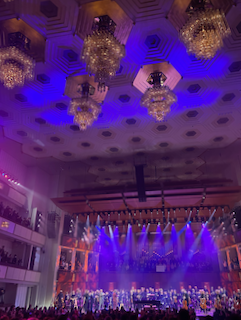“All great and precious things are lonely.” — John Steinbeck
A Note From International Arts Movement
This month, I had the chance to return to a pre-pandemic past time and enjoy some live music. I’ve slipped into a bad habit here in Washington, D.C. of taking for granted so much of the talent, whether it be musical, artistic, or other, that is so readily available in the city. So, it was only fitting that I spent my evening at the Kennedy Center, listening to the National Symphony Orchestra play with one of my favorite artists, Ben Rector.
Beyond the incomparable talent of both the orchestra and Ben himself (and my immediate regret at having quit the 7th grade band), I was struck by one composition in particular. A stunning strings-heavy version of the Beatles cult classic, “Eleanor Rigby.”
The arrangement elicited audience participation; an entire auditorium of young professionals and businessmen and lawyers and people tasked with solving every American problem singing along to the haunting chorus: “Ah, look at all the lonely people!” Without even realizing it, tears sprung to my eyes.
For so many in the room, the chorus of the song was also the chorus of their lives. Living in a busy city, doing important work, caught up in the crowd, but feeling a deep sense of disconnect and loneliness. It had been my story, too, at one point.
I wonder, having sat in that auditorium and having sang those words, both last night and countless nights before, how many of us carry around stories that are hidden deep inside of us. Broken edges and cracked pieces that make up our human soul, but that we hide from those around us, fearing that if we expose ourselves, those cracks and sharp fragments will be turned on us as a weapon.
As I think about what to carry with me into this (relatively) new year, I hope that paying careful attention to both my own soul and the souls of others will be something that I can become to which I can become more attuned. To pay attention to the still, small moments, where a chorus of hundreds reveals a simple cry for more. For connection and conversation and unity. To honor those moments and lean into them, is not only culture care, but soul care.
A Note From Makoto Fujimura, Founder of IAM Culture Care
Haejin and I just returned from a fruitful trip to Asia, going from Japan to Taipei, and then back to Japan for 12 days. We visited 10 museums and several galleries, in a whirlwind trip to catch up to three and a half years of not being able to travel due to Covid shutdown.
Throughout, our Culture Care theme was alive and present, from visiting Zoe Arts in Taipei (which our newsletter covered several months ago) to seeing generative works by Tohaku Hasegawa which speaks after 400 years.
On this trip, we were able to see first hand the masterpiece “Shorinzu Byobu” (Pine Forest Screens) exhibited in January of every year at Tokyo National Museum of Art, as well as the Chishakuin Temple paintings, a collaboration with his son Kyuzo. Kyuzo tragically passed away rather young, and it is speculated that elder Hasegawa painted the “Shorinzu” painting as a lament, in a style that he never did before or since. The pine forest painting stands as one of the most eloquent paintings of lament, of ephemeral realities of our lives being depicted in the fog between the pine trees, with a peak of a mountain appearing in a negative space on top left.
Japanese culture, in her integration of culture and nature, stands as an inspiration to Culture Care themes, from elegies to extravagance of beauty. In fact, when I tried to translate Culture Care book into Japanese, I found it to be too difficult, as the Japanese culture and language has already assimilated and integrated Culture Care in principle in all things. It felt like I would be explaining aerodynamic principles to birds taken flight — it may be done, but rather a meaningless effort. Thus, one might say that Culture Care is a path to understand this integration of culture and nature, but injecting of the Creator’s delight in both.
May our journey toward the New be met with refinement of this integration!
- Mako Fujimura, January 2023
Makoto Fujimura is the 2023 recipient of the Kuyper Prize and author of Art + Faith: A Theology of Making. He will have an extended exhibit at Martha Berry Museum starting this February.
Web Links
|
